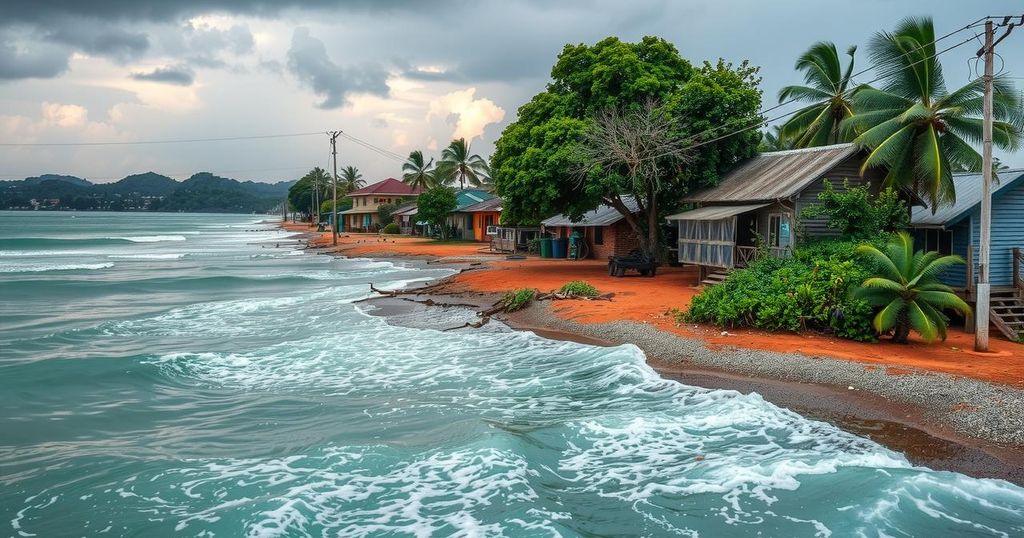Cyclone Chido Exacerbates Climate Crisis Challenges for Mozambique and Malawi

Cyclone Chido has devastated northern Mozambique and southern Malawi, displacing thousands and leading to fatalities. This cyclone, occurring shortly after other major storms, highlights the increasing severity of climate change effects in the region. Immediate humanitarian responses are underway, but concerns about long-term impacts on health, education, and food security persist. Enhanced preparedness and international support are crucial for future resilience efforts.
Cyclone Chido has caused significant destruction in northern Mozambique after hitting the east coast of Africa and impacting Malawi. The cyclone struck on December 15, 2024, leading to the displacement of thousands in Cabo Delgado and Nampula provinces. The increasing frequency of severe cyclones in this region, including Cyclone Freddy in 2023 and Idai in 2019, underscores the challenges posed by climate change. Lucy Mtilatila, the Director of Climate Change and Meteorological Services in Malawi, remarked on how rising Indian Ocean temperatures contribute to cyclone formation, stating that these events were once infrequent but are now more common.
The cyclone resulted in heavy rains exceeding 250 millimeters in a single day and winds reaching 260 km/h. Local authorities reported fatalities, including a three-year-old child in Nampula. Humanitarian organizations are rapidly responding to the crisis, with UNICEF expressing concern over immediate and long-term impacts on education and healthcare access. Approximately 2,800 people are currently in emergency shelters, and the extent of damage in remote areas remains uncertain due to power outages.
Malawi and Mozambique are still in the process of recovering infrastructure lost from previous storms, with estimates suggesting Chido’s severity was comparable to Cyclone Freddy. In response to the cyclone’s arrival, schools in Malawi were closed across 15 districts, and the cyclone weakened as it moved inward. Officials express fears regarding the impact on food security and agriculture, as assessments of agricultural damage are still pending.
Preparation efforts in Malawi for Cyclone Chido highlighted improved coordination among various sectors compared to past cyclones, enabling a more organized response. Mtilatila emphasized the importance of long-term planning to enhance community resilience, including relocating vulnerable populations and strengthening infrastructure. The Malawian government had already secured food and relief supplies prior to the cyclone, responding to the challenges of a country affected by climate-induced droughts and food scarcity.
Relief efforts are being conducted by UNICEF, the UN World Food Program, and ActionAid, among others, with calls for increased international assistance. Mtilatila remarked on the lessons learned from prior cyclones, stressing the need to improve resilience with future reconstruction efforts.
Climate change continues to heighten the frequency and intensity of such natural disasters, prompting experts to urge for comprehensive actions addressing the underlying causes of global warming.
Overall, the situation in Mozambique and Malawi illustrates the urgent need for evolving response strategies to combat the worsening effects of climate change, ensuring communities are better equipped to handle these increasing challenges.
The recent passage of Cyclone Chido through Mozambique and Malawi signifies an alarming trend of increasing cyclone frequency and severity linked with climate change in Southern Africa. The region has been gradually witnessing an escalation of storm intensity, with recent cyclones further exacerbating the humanitarian situation. In light of the human toll and infrastructural damage caused by these weather events, effective disaster preparedness and response measures are crucial to mitigate adverse effects. Monitoring ocean temperatures and enhancing resilience strategies will be vital in addressing these challenges moving forward.
In summary, Cyclone Chido has inflicted considerable damage in Mozambique and Malawi, revealing the deepening impact of climate change through increasing cyclone occurrences. While immediate humanitarian responses are underway, the long-term implications for education, health, and food security are concerning. Enhanced preparedness and international support are imperative to build resilience against future climatic crises. The communities in both nations must prioritize strategic planning and infrastructure development to bolster their capacity to withstand forthcoming natural disasters.
Original Source: www.dw.com







